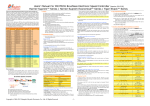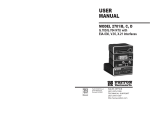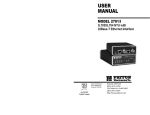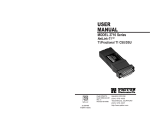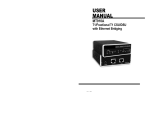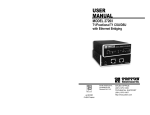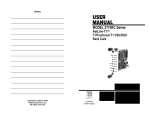Download Black Box CSU/DSU Specifications
Transcript
JANUARY 1998 MT100A-35-R2 MT100A-449-R2 MT100A-530-R2 T1 CSU/DSU (V35) T1 CSU/DSU (449) T1 CSU/DSU (530) CUSTOMER SUPPORT INFORMATION Order toll-free in the U.S.: Call 877-877-BBOX (outside U.S. call 724-746-5500) FREE technical support 24 hours a day, 7 days a week: Call 724-746-5500 or fax 724-746-0746 Mailing address: Black Box Corporation, 1000 Park Drive, Lawrence, PA 15055-1018 Web site: www.blackbox.com • E-mail: [email protected] T1 CSU/DSU T1 CSU/DSU Installation and Operation Manual ————— FEDERAL COMMUNICATIONS COMMISSION RADIO FREQUENCY INTERFERENCE STATEMENT This equipment generates, uses and can radiate radio frequency energy and if not installed and used properly, that is in strict accordance with the manufacturer’s instructions, may cause interference to radio communication. It has been tested and found to comply with the limits for a Class A computing device in accordance with the specifications in Subpart J of Part 15 of FCC rules, which are designed to provide reasonable protection against such interference when operated in a commercial environment. Operation of this equipment in a residential area is likely to cause interference, in which case the user at his own expense will be required to take whatever measures may be required to correct the interference. Registration Numbers FCC Registration Number (unit): ................................GBRUSA-18888-DE-N UL listing (power supply): ............................................UL3458 DS&G Registration Number .........................................US Safety: E3067 Canadian Use Registration Number : ..........................1596 4190 ACS03–7784 CSA Registration Number (unit): ................................CSA LR3067 CSA Registration Number (power supply): .................CSA LR60602 1 T1 CSU/DSU TABLE OF CONTENTS 1.0 Specifications ............................................................................................................. 4 2.0 Introduction ............................................................................................................... 6 2.1 General Information .................................................................................................. 6 2.2 Purpose of this Manual ............................................................................................... 6 2.3 Bantam Jacks ............................................................................................................... 6 2.4 Loopback Switches ....................................................................................................... 6 2.4.1 Remote CSU/Aggregate Loopback ................................................................ 7 2.4.2 Remote Channel Loopback ............................................................................. 7 2.4.3 Local Channel Loopback Diagnostic .............................................................. 7 2.4.4 Local Aggregate Loopback .............................................................................. 7 2.5 Network LEDs ............................................................................................................. 7 2.6 Channel LEDs ............................................................................................................. 8 2.7 Rear Panel Controls and Interface Connectors ........................................................ 8 2.8 Channel Interface Connections ................................................................................. 8 2.8.1 Power Connection ............................................................................................ 8 2.8.2 Network Connections ....................................................................................... 8 3.0 Installation ................................................................................................................. 3.1 Introduction .............................................................................................................. 3.2 Site Preparation ........................................................................................................ 3.3 Installation Procedure .............................................................................................. 3.4 Equipment Cabling ................................................................................................... 3.4.1 Network Cabling ............................................................................................. 3.4.2 DTE Channel Cabling .................................................................................... 3.4.3 Power Cabling and Initial Power Up ............................................................. 4.0 Operation 11 4.1 Introduction .............................................................................................................. 11 4.1.1 Modify Configuration ..................................................................................... 11 Configuration Worksheet ................................................................................. 12—16 4.1.2 Configuration Tables .............................................................................. 17—19 10 10 10 10 10 10 10 10 Appendix A: FCC Documentation Requirements ..................................................................20 Appendix B: TELCO Affidavit..............................................................................................21 2 T1 CSU/DSU FIGURES AND TABLES LIST OF FIGURES Figure 2-1. Figure 2-2. Figure 2-3. Figure 2-4. Figure 2-5. Figure 2-6. Figure 2-7. Remote CSU/Aggregate Loopback .............................................................. 7 Remote Channel Loopback ........................................................................... 7 Local Channel Loopback .............................................................................. 7 Local Aggregate Loopback ............................................................................ 7 Rear Panel Connections ................................................................................ 9 Power Connector Pin Out ............................................................................. 9 Network Connector: DB15-to-RJ48 pigtail cable .......................................... 9 LIST OF TABLES Table 2-1. Table 4-1. Table 4-2. Table 4-3. Table 4-4. Table 4-5. Table 4-6. V.35 Pin Out ................................................................................................... 8 Configuration Switch 1 Settings .................................................................. 17 Data Rate Selection and DS0 Allocation .................................................... 17 Aggregate Timing Selection ........................................................................ 18 Configuration Switch 3 Settings .................................................................. 18 Output Pulse Selection ................................................................................ 19 Density Selection .......................................................................................... 19 3 T1 CSU/DSU 1.0 SPECIFICATIONS Configuration - DIP-switch selectable, readily accessible from the rear panel Aggregate - Recommended Cable Requirement: Twisted Shielded-Pair - Line Rate: 1.544 Mbps +/– 50 bps - Line Format: AMI or B8ZS - Framing Format: D4 or ESF(Fe) - Pulse Characteristics: AT&T 62411 Compliance - Output Amplitude: 2.4 to 3.3 V peak to base - Receiver sensitivity: 0 to –26 dB - Line Buildout (CSU): 0dB, –7.5 dB, –15 dB - Line Distance (DSX-1 Mode): 0 to 655 Feet - Line Distance (CSU Mode): 0 to 6000 Feet with 24 AWG - Interface: RJ45 - Density Monitoring: 1 of 16, 1 of 48, 1 of 64 or None Internal CSU - Meets FCC Part 68 requirements - Meets AT&T Pub 62411 - Local and Remote Loopback Diagnostics - Type 1 Keep-Alive Signal Clocking Modes - Internally Provided - External From Network (loop) - External From Channel 4 CHAPTER 1: Specifications DTE Channels MT100A–35-R2: CCITT V.35 interface; 34-pin M block (female) connector MT100A–449-R2: EIA RS-449 interface; DB37(female) connector MT100A–530-R2: EIA RS-530 interface; DB25 (female) connector - Density: Alternate DS0 (Fractional T1), Bit 7 stuffing, or None - Selectable DTE Channel Rates N X 56 kb/s (56, 112, 168, 224, 336, 448, 672, or 1,344) - Selectable DTE Channel Rates N x 64 kb/s (64, 128, 192, 256, 384, 512, 768, or 1,536. Compatibility - AT&T Pub 62411 - AT&T Pub 54019A - Carrier T1 Service Offerings - Carrier Fractional T1 Service Offerings Approvals - FCC Parts 15 and 68 - UL - CSA Diagnostics - Local Aggregate Loopback - Remote CSU Loopback - Local and Remote Channel Loopbacks - Tx/Rx Monitor Jacks and Network In and Network Out Jacks - Test LED lit when active Front Panel Network Indicators - Loss Of Signal (LOS) - Bipolar Violations (BPV) - Synchronization - Red Alarm - Yellow Alarm - Test 5 T1 CSU/DSU Front Panel DTE Channel Indicators - Transmit Data (TD) - Receive Data (RD) - Request To Send (RTS) - Receive Line Signal Detect (RLSD) Standalone Unit - Size: 1.5"H x 7.25"W x 10.5"D (3.8 x 18.4 x 26.7 cm) - Weight: 2 lb. (0.9 kg) - Power: External Wall Mount Power Supply Environmental - Temperature: 32° to 122°F (0° to 50°C) - Storage Temperature: –4° to 176°F (–20° to 80° C) - Relative Humidity: 0 to 95% noncondensing - Maximum Altitude: 15,000 ft. (4572m) Mean Time Between Failure (Estimated) – 40,000 hours 6 CHAPTER 2: Introduction 2.0 INTRODUCTION 2.1 General Information The T1 CSU/DSU product line is a high speed T1 format processor with one of three interfaces for the DTE channel: CCITT V.35; RS-449; RS-530. It is capable of processing data at speeds from 56kb/s to 1.536Mb/s, depending upon the format and density requirements of the application. It provides all the framing and density requirements for data transmission across predefined network facilities, such as ACCUNET. The T1 CSU/DSU, because of its unique design, is able to accept timing information from any clock. Timing information may be derived from the receive data, an external DTE, or from the internal crystal oscillator. The T1 CSU/DSU has a series of selectable diagnostics that allow the user to quickly and accurately troubleshoot the T1 CSU/DSU and the associated network. The T1 CSU/DSU has a built in CSU which complies with AT&T Publication 62411. This allows the user to attach the T1 CSU/DSU directly to the T1 Circuit. This CSU can be enabled or disabled with a simple switch setting so that the unit can act as a DSU or as a DSU/CSU. It can also be used as a high speed line driver to extend high speed data circuits up to 6,000 feet over shielded twisted-pair cable. 2.2 Purpose The purpose of this document is to present to the reader the information necessary to completely understand the operation, installation, and diagnostic procedures associated with the T1 CSU/DSU. Chapter 1 provides the technical specifications for the T1 CSU/DSU. This chapter presents a brief description of the unit, and its features and applications. Chapter 3 gives you the installation and initial power-up procedures. Chapter 4 explains the interactive programming procedures associated with the T1 CSU/DSU, and Chapter 5 gives a detailed explanation of the T1 CSU/DSU diagnostic procedures. The T1 CSU/DSU contains all the controls and indicators necessary to configure, monitor, diagnose, and operate the system. The front panel contains four bantam jack receptacles for network data monitoring and test signal injection, loopback selection switches for aggregate and channel loopbacks, and a series of LEDs that reflect the status of both the network and the DTE channel. 2.3 Bantam Jacks The Bantam Jacks, located on the T1 CSU/DSU front panel, provide easy access to both monitor the T1 service without interrupting the transmission of information or to inject a test signal to exercise the T1 circuit. To monitor the T1 service, connect a test set to the T1 CSU/DSU via the Transmit Monitor (NET TX MON) Bantam Jack and the Receive Monitor (NET RX MON) Bantam Jack. This allows the user to monitor the T1 service without interrupting the information flow. To inject and receive a test signal across the T1 transmission facility, connect the test set into the IN (NET TX IN) and OUT (NET RX OUT) Bantam Jacks. Then, place the T1 CSU/DSU in Remote Channel Loopback. In this configuration the operator can inject a known signal and receive it back via the network for testing purposes. This is an interruptive test. Data integrity can not be guaranteed during this test. 7 T1 CSU/DSU 2.4 Loopback Switches There are two Loopbacks switches on the front panel of the of the T1 CSU/DSU. Both switches allow the user to test individual sections of data transmission path. This ability to test these individual paths allows the user to isolate, diagnose, and then perform corrective action to resolve data transmission problems in the network. 2.4.1 REMOTE CSU/AGGREGATE LOOPBACK The REMOTE CSU/AGGREGATE LOOPBACK (see Figure 2-1) test lets you verify the logic from the local interface through the remote aggregate and back to the local channel interface. To select this test, position the AGGREGATE LOOPBACK switch in the REMOTE position. When complete, return this switch to the center position. TX CHANNEL Test Equip. TX RX RX TX CHANNEL RX TX RX Figure 2-1. Remote CSU/Aggregate Loopback. 2.4.2 REMOTE CHANNEL LOOPBACK To verify the remote unit’s channel logic from the local unit (Figure 2-2), select the remote position of the AGGREGATE LOOPBACK switch. When complete, reposition this switch to the center position. TX CHANNEL Test Equip. TX RX RX TX CHANNEL RX TX RX Figure 2-2. Remote Channel Loopback. 2.4.3 LOCAL CHANNEL LOOPBACK DIAGNOSTIC Local Channel Loopback Diagnostic (Figure 2-3) enables you to verify the channel interface. To run this test, position the CHANNEL LOOPBACK SWITCH in the LOCAL position. When complete, reposition the switch to the center position. TX Test Equip. CHANNEL TX RX RX TX CHANNEL RX Figure 2-3. Local Channel Loopback. 8 RX TX CHAPTER 2: Introduction 2.4.4 LOCAL AGGREGATE LOOPBACK The LOCAL AGGREGATE LOOPBACK diagnostic (Figure 2-4) enables the user to verify the T1 CSU/DSU logic from the channel interface, through the aggregate, and return to the channel interface. To select this test, position the AGGREGATE LOOPBACK switch in the LOCAL position. When complete, reposition the switch to the center position. TX Test Equip. CHANNEL TX RX RX TX CHANNEL RX TX RX Figure 2-4. Local Aggregate Loopback. 2.5 NETWORK LEDs Six LEDs indicate network function of the unit: Loss Of Signal (LOS), Bipolar Violations (BPV), RED and YELLOW alarms, SYNC, and TEST. LOS LED — when illuminated, indicates the lack of sufficient signal pulses(marks) at the network receiver. The LED is illuminated when more than 175 consecutive zeros are received and is extinguished when the next mark is detected. Bipolar Violations LED — when illuminated, indicates that a pulse was received that is of the same polarity as the preceding pulse(excluding B8ZS codewords), thus violating the Alternative Mark Inversion Rule. RED ALARM LED — illuminated when the receiver has lost frame synchronization for 2 to 2.5 seconds. The LED is extinguished when FRAME SYNC has been acquired for at least eight consecutive seconds. YELLOW ALARM LED — illuminated while a YELLOW ALARM indication is being received from the remote unit. The remote unit will transmit a YELLOW ALARM indication while in the RED ALARM state. While operating in D4 framing, the YELLOW ALARM condition is transmitted by forcing bit 2 of every DS0 to a zero state. In ESF framing mode, the YELLOW ALARM condition is a pattern embedded in the framing overhead. SYNC LED — lit when the local unit is in SYNC with the remote unit. It is extinguished when synchronization is lost. Frame sync criteria is the receipt of 10 consecutive F bits. Sync loss criteria is receipt of 2 of 4 consecutive frame word errors. TEST LED — lit whenever the unit is in a selected diagnostic mode or test ,or while the unit is sending diagnostic patterns. 2.6 CHANNEL LEDs The four LEDs below the CHANNEL heading represent the status of the channel side of the unit. The Channel TD (green) LED is illuminated when the channel is transmitting a space. The Channel RD (green) LED is illuminated when the channel is receiving a space. The Request to Send (RTS) LED is illuminated when the Request to Send function is active. The Channel RLSD (green) LED is illuminated when the channel’s Receive Line Signal Detect function is active. 2.7 REAR PANEL CONTROLS AND INTERFACE CONNECTORS The rear panel (Fig. 2-5) provides access to the physical interfaces necessary to connect the unit to a network. Depending on the model, there is one of the following female connectors on the rear panel for the DTE interface: 34-pin M block (V.35); DB37 (RS-449); or DB25 (RS-530). There is also a five-pin DIN power connector for applying logic power (–5 and +/–12 VDC) to the unit. There are two DIP switches—Switch 1 and Switch 3—along with the LBO switch (Switch 2). 9 T1 CSU/DSU NOTE When operating as a channel service unit (CSU), the setting of the Line Build Out function is dictated by the carrier and must be set as the carrier specifies. Otherwise, the LBO Switch must be set to zero (0) dB position. 2.8 CHANNEL INTERFACE CONNECTIONS T1 CSU/DSU is configured for DTE connection with one of these three interfaces: V.35; RS-449; or RS530 (female connectors). Below are the pin-outs (male connectors) for these interfaces. V.35 Pin Out (34-pin male connector) PIN FUNCTION A . . . . . . . . . . . . . . . . . . . . . . .GROUND D . . . . . . . . . . . . . . . . . . . . . . . . .CTS E . . . . . . . . . . . . . . . . . . . . . . . . .DSR F . . . . . . . . . . . . . . . . . . . . . . . . .DCD P . . . . . . . . . . . . . . . . . . . . . . . . .SD(A) R . . . . . . . . . . . . . . . . . . . . . . . .RD(A) S . . . . . . . . . . . . . . . . . . . . . . . . .SD(B) PIN FUNCTION T . . . . . . . . . . . . . . . . . . . . . . .RD(B) U . . . . . . . . . . . . . . . . . . . . . . . .TT(A) V . . . . . . . . . . . . . . . . . . . . . . .RT(A) W . . . . . . . . . . . . . . . . . . . . . . .TT(B) X . . . . . . . . . . . . . . . . . . . . . . .RT(B) Y . . . . . . . . . . . . . . . . . . . . . . . .ST(A) AA . . . . . . . . . . . . . . . . . . . . . . .ST(B) RS-449 Pin Out (DB37 male connector) 1 ..........................................Shield 2 ..............................Signal Rate Indicator 3 ..............................................— 4 ....................................Send Data (A) 5 ..................................Send Timing (A) 6 ..................................Receive Data (A) 7................................Request ToSend (A) 8 ................................Receive Timing (A) 9..................................Clear To Send (A) 10 ..................................Local Loopback 11....................................Data Mode(A) 12 ..............................Terminal Ready (A) 13 ..............................Receiver Ready (A) 14 ................................Remote Loopback 15 ....................................Incoming Call 16 ................................Select Frequency 17 ..............................Terminal Timing (A) 18 ......................................Test Mode 19....................................Signal Ground 20 21 22 23 24 25 26 27 28 29 30 31 32 33 34 35 36 37 . . . . . . . . . . . . . . . .Receive Common . . . . . . . . . . . . . . . . . . . . . . .— . . . . . . . . . . . . . . . . . .Send Data (B) . . . . . . . . . . . . . . . . .Send Timing (B) . . . . . . . . . . . . . . . . .Receive Data (B) . . . . . . . . . . . . . . .Request to Send (B) . . . . . . . . . . . . . . . .Receive Timing (B) . . . . . . . . . . . . . . . . .Clear to Send (B) . . . . . . . . . . . . . . . .Terminal in Service . . . . . . . . . . . . . . . . . . .Data Mode . . . . . . . . . . . . . . . .Terminal Ready (B) . . . . . . . . . . . . . . . .Receiver Ready (B) . . . . . . . . . . . . . . . . . .Select Standby . . . . . . . . . . . . . . . . . .Signal Quality . . . . . . . . . . . . . . . . . . .New Signal . . . . . . . . . . . . . . . .Terminal Timing (B) . . . . . . . . . . . . . . . . .Standby/Indicator . . . . . . . . . . . . . . . . . .Send Common RS-530 Pin Out (DB25 male connector) 1 . . . . . . . . . . . . . . . . . . . . . . . .Shield (A) 2 . . . . . . . . . . . . . . . . . . .Transmitted Data (A) 3 . . . . . . . . . . . . . . . . . . . .Received Data (A) 4 . . . . . . . . . . . . . . . . . . . .Request to Send (A) 5 . . . . . . . . . . . . . . . . . . . . .Clear to Send (A) 6 . . . . . . . . . . . . . . . . . . . . . .DCE Ready (A) 7 . . . . . . . . . . . . . . . . . . . . . .Signal Ground 8 . . . . . . . . . . . . . .Received Line Signal Detector (A) 9 . . . . . . . . . . .Receiver Signal Element Timing–DCE (B) 10 . . . . . . . . . . . . . .Received Line Signal Detector (B) 11 . . . . . . . . . .Transmitter Signal Element Timing–DTE (B) 12 . . . . . . . . .Transmitter Signal Element Timing–DCE (B) 13 . . . . . . . . . . . . . . . . . . . .Clear to Send (B) 14 ......................................Transmitted Data (B) 15 ..........................Transmitter Signal Element DCE (A) 16 ........................................Received Data (B) 17 ......................Receiver Signal Element Timing DCE (A) 18 ..........................................Local Loopback 19 ..........................................Request to Send 20 ..........................................DTE Ready (A) 21 ........................................Remote Loopback 22 ..........................................DCE Ready (B) 22 ..........................................DCE Ready (B) 23 ..........................................DTE Ready (B) 24 ....................Transmitter Signal Element Timing DTE (A) 25 ..............................................Test Mode 2.8.1 POWER CONNECTION The power connector (female) is on the rear panel. The male connector of the DC power supply plugs into this female connector. Fig. 2-6 shows the pinout of the 5-pin DIN connecter. 2.8.2 NETWORK CONNECTION The Network connector is an RJ48C modular connector with an RJ48C-to-DB15 pigtail cable (not supplied). Refer to Figure 2-7. 10 CHAPTER 2: Introduction POWER V.35, RS-449, or RS-530 channel NETWORK SW 1 LBO 0 –7.5 –15 SW 3 SW 2 SEE BASE FOR SWITCH SETTING INFORMATION Figure 2-5. Rear Panel Connections. VM Series Regaulated Table Top Power Supply Pin 1 = Common Pin 2 = N/C Pin 3 = +5V Pin 4 = –12V Pin 5 = +12V 3 1 5 4 2 Figure 2-6. Power Connector Pin Out. DB15 RJ48C Signal 1 5 TX TIP 3 2 RX TIP 9 4 TX RING 11 1 RX RING 2 and 7 7 and 8 GND 8 15 1 9 DB15 Male Connector 87654321 8-Pin RJ48C Connector Figure 2-7. Network Connector: DB15-to-RJ48 pigtail cable. 11 T1 CSU/DSU 3.0 INSTALLATION 3.1 INTRODUCTION This chapter has the information necessary to plan, perform and verify the mechanical and electrical installation of the T1 CSU/DSU. Before installing the T1 CSU/DSU, read and completely understand the information presented here. 3.2 SITE PREPARATION The T1 CSU/DSU should be installed within 7 feet of a grounded AC outlet furnishing 115/230VAC. The location should be clean, well lighted, and conform to the standards for computer equipment installations. Allow a 36 inch clearance for both the front and back of the unit for access during operation and maintenance. When connecting the interface cables, allow 4 feet of slack in the cables so that you can move the unit to perform service without disconnecting the cables. 3.3 INSTALLATION PROCEDURE Before installing the T1 CSU/DSU system, carefully read and understand the total installation procedure. 3.3.1 UNPACKING Although we take great care to insure that the T1 CSU/DSU is properly packaged so that it will not be damaged during transit, it is the customer’s responsibility to verify that the unit arrives undamaged. Before unpacking the T1 CSU/DSU, read the following: 1. Carefully remove all packing material from the T1 CSU/DSU. 2. Inspect the equipment for damage that may have occurred during shipment. If any damage is noted, contact the shipping agent and the manufacturer. NOTE The T1 CSU/DSU shipping carton is designed to ensure that the device arrives at the customer’s location undamaged. If it ever becomes necessary to move the T1 CSU/DSU to another location, it is advisable to save the shipping carton for such use. 3.4 EQUIPMENT CABLING 3.4.1 NETWORK CABLING The Network connector is an RJ48C modular type connector with an optional RJ48C-to-DB15 pigtail cable (not supplied). Depending upon the configuration of the network, either connect the network line cable directly into the unit or first connect the RJ48C-to-DB15 pigtail cable into the unit and then connect the network line cable to the DB15 end of the pigtail cable. 3.4.2 DTE CHANNEL CABLING The T1 CSU/DSU is configured at the factory to be connected via an industry standard channel interface using either a V.35, RS-449, or RS-530 cable. When the DTE interface cable is in position and seated, secure it with the two jack screws. For information about DTE interface pinouts, see Section 2.8, Channel Interface Connections on page 8. 12 CHAPTER 3: Installation 3.4.3 POWER CABLING AND INITIAL POWER UP NOTE Before connecting the power cable to the T1 CSU/DSU, ensure that the unit is properly configured and all interface cables are connected and seated. Power to the T1 CSU/DSU is supplied by a separate DC Power Supply. Insert the power supply male DIN connector into the female DIN connector at the rear of the unit. Insert the power cable male connector into a grounded AC power receptacle. At this time power is applied to the T1 CSU/DSU. 13 T1 CSU/DSU 4.0 OPERATION 4.1 INTRODUCTION The T1 CSU/DSU is controlled by a series of simple switch settings that the operator can select by accessing Switches one, two, and three at the rear of the unit. 4.1.1 MODIFY CONFIGURATION To configure a new T1 CSU/DSU Series unit or modify the configuration of an existing T1 CSU/DSU Series unit, first determine the correct information by reviewing following worksheet. This worksheet should be copied and annotated so that when completed it can be saved for future reference. Before completing the worksheet, the user should have a complete understanding of the application being served by the T1 CSU/DSU format processor. 14 CHAPTER 4: Operation Configuration Worksheet CUSTOMER NAME: _______________________________________________________ DATE: _______________________________________________________ CUSTOMER LOCATION: _______________________________________________________ CONFIGURATION: _______________________________________________________ SWITCH ONE SETTINGS 1. DATA RATE SELECTION (SEE TABLE 3-2) ...................................S1-1 S1-2 S1-3 2. DTE Channel Multiples .....................................................................N X 56 kb/s: S1-4: ON N X 64 kb/s: S1-4: OFF Selectable N X 56 Rates: 8, 16, 24, 32, 40, 48, 56, 64, 112, 168, 192, 224, 280, 320, 336, 448, 560, 672, 840, 960, 1120, and 1344kbps. NOTE For specific speed selection information refer to Table 4-2 Selectable N X 64 Rates: 8,16, 24, 32, 40, 48, 64,128,192, 256, 320, 384, 512, 640, 768, 960,1280, and 1536kb/s. NOTE For specific speed selection information refer to Table 3-2. 15 T1 CSU/DSU 3. CHANNEL SEND TIMING: A. LOOP 1 (Terminal Timing) ........................................S1-5: ON B. LOOP 2 (Send Timing) ...............................................S1-5: OFF 4. CHANNEL TIMING: A. NORMAL .......................................................................S1-6: ON B. INVERTED ....................................................................S1-6: OFF 5. CHANNEL DATA: A. NORMAL ......................................................................S1-7: 0N B. INVERTED ....................................................................S1-7: OFF 6. REQUEST TO SEND CONTROL A. ALWAYS ON ..................................................................S1-8: ON B. CONTROLLED .............................................................S1-8: OFF 7. AGGREGATE TIMING SELECTION: A. INTERNAL (MASTER) CRYSTAL TIMING........................S1-9: ON S1-1 0: ON B. LOOP (SLAVE) TIMING......................................................S1-9: OFF S1-1 0: ON C. EXTERNAL CHANNEL TIMING (NOTE 1 ).....................S1-9: ON S1-1 0: OFF D. INTERNAL (MASTER) CRYSTAL TIMING .......................S1-9: OFF S1-10: OFF NOTE If the EXTERNAL CHANNEL TIMING selection is made, then the associated CHANNEL SEND TIMING must be set to Loop 1 Timing. When operating in this mode, the DCE provides the network timing. 16 CHAPTER 4: Operation SWITCH TWO SETTINGS 1. LBO SETTlNG (Active only in the CSU mode of operation. When operating in the DSX-1 mode, the LBO switch must be in the zero [0] dB position.). Position the LBO switch as directed by the carrier: A. –1 5dB B. –7.5dB C. 0dB SWITCH THREE SETTINGS 1. NETWORK FRAMING: A. D4: .......................................................................................S3-1: ON B. ESF(Fe): ................................................................................S3-1: OFF 2. NETWORK LINE CODE: A. AMI: .......................................................................................S3-2: ON B. B8ZS: ......................................................................................S3-2: OFF 3. NETWORK INTERFACE: A. CSU: .......................................................................................S3-3: ON S3-4: OFF S3-5: ON NOTE If the CSU Mode of operation is selected, then the LBO switch must be set as defined by the carrier. Refer to Switch 2 setting information presented below. If the CSU Mode is selected, then all the DSX-1 selections are invalid. If the unit is not to be operated as a CSU but in the DSX-1 mode, then the TRANSMIT OUTPUT PULSE must be defined. 17 T1 CSU/DSU In making the following 5 selections, the operator defines the mode of operation as DSX1 and also specifies the proper transmit output pulse. 4. TRANSMIT OUTPUT PULSE: (DSX-1 Mode Only. If any of the output pulse selections are made, then the CSU selection is invalid. If a DSX-1 Mode is selected, verify that the LBO Switch is in the O position.) The TRANSMIT OUTPUT PULSE selection is determined by the distance between the unit and the external CSU. A. 000 – 133 FT ..........................................................................S3-3: OFF S3-4: OFF S3-5: ON B. 133 – 266 FT ..........................................................................S3-3: ON S3-4: ON S3-5: OFF C. 266 – 399 FT ..........................................................................S3-3: OFF S3-4: ON S3-5: OFF D. 399 – 533 FT..........................................................................S3-3: ON S3-4: OFF S3-5: OFF E. 533 – 655 FT ..........................................................................S3-3: OFF S3-4: OFF S3-5: OFF 5. DENSITY MONITOR: A. 1 IN 16 ...........................................................................S3-6: OFF S3-7: ON S3-8: ON B. 1 IN 32 ..........................................................................S3-6: OFF S3-7: OFF S3-8: ON C. 1 IN 48 ..........................................................................S3-6: OFF S3-7: ON S3-8: OFF 18 CHAPTER 4: Operation D. 1 IN 64 ...........................................................................S3-6: OFF S3-7: OFF S3-8: OFF E. NONE ...........................................................................S3-6: ON S3-7: N/A S3-8: N/A 6. ZERO BYTE SUPPRESSION A. INHIBIT: .......................................................................S3-9: ON B. ACTIVE: ........................................................................S3-9: OFF 7. DS0 MAPPING A. CONTIGUOUS: ...................................................................S3-10: ON B. ALTERNATE: ........................................................................S3-10: OFF NOTE Refer to Table 4-2 for the information pertaining to the DSOs used with either contiguous or alternate DS0 mapping. When the configuration worksheet is complete and verified, you can configure the unit by simply setting the switches on the rear panel as defined on the worksheet. 19 T1 CSU/DSUT1 CSU/DSUNAME 4.1.2 CONFIGURATIONS TABLES When the user becomes proficient with the configuration procedures of the T1 CSU/DSU Series unit, it may easier and simpler to use the configuration tables presented below and also available on the bottom of the device to quickly configure the T1 CSU/DSU Series unit. Table 4-1. Configuration Switch 1 Settings. POSTION DESCRIPTION ON OFF 1 DATA RATE SELECTION SEE TABLE 4-2 2 DATA RATE SELECTION SEE TABLE 4-2 3 DATA RATE SELECTION SEE TABLE 4-2 4 RATE MULTIPLE N x 56K N x 64K 5 CHANNEL SEND TIMING LOOP 1 LOOP 2 6 CHANNEL TIMING NORMAL INVERT 7 CHANNEL DATA NORMAL INVERT 8 RTS ON CONTROLLED 9 AGGREGATE TIMING SELECTION SEE TABLE 4-3 10 AGGREGATE TIMING SELECTION SEE TABLE 4-3 Table 4-2. Data Rate Selection and DS0 Allocation. S14 ON 20 DATA RATE(Kbps) S14 OFF S1-1 S1-2 S1-3 DSO’S USED S3-10 S3-10 ON OFF 56 64 ON ON ON 1 1-2 112 128 OFF ON ON 1-2 14 168 192 ON OFF ON 1-3 1-6 224 256 OFF OFF ON 14 1-8 336 384 ON ON OFF 1-6 1-12 448 512 OFF ON OFF 1-8 1-16 672 768 ON OFF OFF 1-12 1-24 1344 1536 OFF OFF OFF 1-24 N/A CHAPTER 4: Operation Table 4-3. Aggregate Timing Selection. TRANSMIT TIMING REFERENCE S1–9 S1–10 INTERNAL (MASTER) CRYSTAL TIMING ON ON LOOP (SLAVE) TIMING OFF ON EXTERNAL CHANNEL TIMING ON OFF INTERNAL (MASTER) CRYSTEL TIMlNG OFF OFF Table 4-4. Configuration Switch 3 Settings. POSITION DESCRIPTION ON OFF 1 FRAMING FORMAT D4 ESF (Fe) 2 ENCODING FORMAT AMI B8ZS 3 OUTPUT PULSE SEE TABLE 4-5 4 OUTPUT PULSE SEE TABLE 4-5 5 OUTPUT PULSE SEE TABLE 4-5 6 DENSlTY SELECTION SEE TABLE 4-6 7 DENSlTY SELECTION SEE TABLE 4-6 8 DENSlTY SELECTION SEE TABLE 4-6 9 ZERO BYTE SUPPRESSION INHIBIT ACTIVE 10 DS0 MAPPING CONTIGUOUS ALTERNATIVE 21 T1 CSU/DSUT1 CSU/DSUNAME Table 4-5. Output Pulse Selection. LINE LENGTH SELECTED S3-3 S3-4 S3-5 N/A ON ON ON N/A OFF ON ON CSU ON OFF ON DSX–1 000 – 133 FEET OFF OFF ON DSX–1 133 – 266 FEET ON ON OFF DSX–1 266 – 399 FEET OFF ON OFF DSX–1 399 – 533 FEET ON OFF OFF DSX–1 533 – 655 FEET OFF OFF OFF Table 4-6. Density Selection. 22 RATIO S3-6 S3-7 S3-8 1 IN 16 OFF ON ON 1 IN 32 OFF OFF ON 1 IN 48 OFF ON OFF 1 IN 64 OFF OFF OFF NONE ON N/A N/AQ APPENDIX A: FCC Documentation Requirements FCC DOCUMENTATION REQUIREMENTS The following information is required by FCC Part 68 Rules which inform the user of his rights and obligations in connecting this equipment to he network and in ordering service. This equipment complies with Part 68 of FCC Rules. Please note the following: 1. When you order service, the telephone company needs to know: a. The Facility Interface Code: 04DU-B (1.544 MB D4 framing format) 04DU9-C (1.544 MB ESF format) b. The Service Order Code: 6.0F A signal power affidavit will be required to guarantee encoded analog content and billing protection unless this unit is used in combination with an XD type device or no encoded analog signals and billing information are transmitted. A sample of the affidavit is attached. For most uses, the second box is appropriate. c. The USOC Jack Required: RJ48C In addition, if requested, please inform the telephone company of the make, model and FCC Registration Number, which are on the label. 2. Your telephone company may make changes in its facilities, equipment, operations or procedures that could affect the proper functioning of your equipment. If they do, you will be notified in advance to give you an opportunity to maintain uninterrupted telephone service. 3. If your telephone equipment causes harm to the telephone network, the telephone company may discontinue your service temporarily. If possible, they will notify you in advance, but if advance notice is not practical, you will be notified as soon as possible. You will be informed of your right to file a complaint with the FCC. 4. If you experience trouble with the telephone equipment, please contact us for information on obtaining service or repairs. Repairs should be performed by us or our authorized agent. 5. You are required to notify the telephone company when this unit is disconnected from the network. 23 T1 CSU/DSUT1 CSU/DSUNAME AFFIDAVIT FOR THE CONNECTION OF CUSTOMER PREMISES EQUIPMENT TO 1.544 MBPS AND/OR SUBRATE DIGITAL SERVICES. For work to be performed in the certified territory of ___________________________________________________________________________________________ (TELCO Name) State of: ___________________________________________________________________________________ County of: ________________________________________________________________________________ I ___________________________________________, ____________________________________________ (name) (Business Address) representing ______________________________________________( )______—__________________ (Telephone Number) being duly sworn, state: I have responsibility for the operation and maintenance of the terminal equipment to be connected to ____________________ 1.544 Mbps and/or _____________________ Subrate digital services. The terminal equipment complies with Part 68 of the Commission’s rules except for the encoded analog content and billing protection specifications. With respect to encoded analog content and billing protection: I attest that all operations associated with the establishment, maintenance and adjustment of the digital CPE with respect to encoded analog content ant encoded billing information continuously complies with Part 68 of the FCC’s Rules and Regulations. The digital CPE does not transmit digital signals containing encoded analog content or billing information which is intended to be decoded within the telecommunications network. The encoded analog and billing protection is factory set and is not under the control of the customer. 24 APPENDIX B: TELCO Affidavit I attest that the operator(s)/maintainer(s) of the digital CPE responsible for the establishment, maintenance and adjustment of the encoded analog content and billing information has (have) been trained to perform these functions by successfully completing one of the following (Check appropriate one(s)) a. A training course provided by the manufacturer/grantee of the equipment used to encode analog signals; or b. A training course provided by the customer or authorized representative, using training materials and instructions provided by the manufacturer/grantee of the equipment used to encode analog signals; or c. An independent training course (e.g., trade school or technical institution) recognized by the manufacturer/grantee of the equipment used to encode analog signals; or d. In lieu of the preceding training requirements, the operator(s)/maintainer(s) is (are) under control of a supervisor trained in accordance with __________ above. (circle one) I agree to provide_________________________with proper documentation to demonstrate compliance with the information as provided in the preceding paragraph, if so requested. Signature ____________________________________ Title ________________________________________ Date ________________________________________ Subscribed and Sworn to before me this _______day of_____________________,19_____ _____________________________________________ Notary Public My commission expires: _______________________ 25 © Copyright 1998. Black Box Corporation. All rights reserved. 1000 Park Drive • Lawrence, PA 15055-1018 • 724-746-5500 • Fax 724-746-0746



























